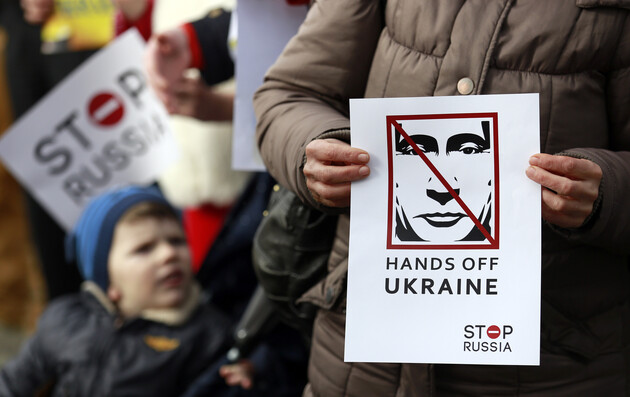It is vital that Moscow understands that any attack will have risks, and we must wait for the right response.

Vladimir Putin failed to quickly overthrow the democratically elected government in Kiev . Now he was faced with a choice: either to agree to negotiations and end the war, or to escalate. A certain dialogue is already underway, but Putin himself is sending signals that he will not agree to anything other than the complete surrender of Ukraine.
Two weeks ago, CIA Director William Barnes told Congress that the Russian leader “is likely to raise rates.” He “will try to defeat the Ukrainian army, despite the civilian casualties.” The President of the Chicago Board of Global Affairs and former US Ambassador to NATO Ivo Daalder writes about this in the pages of The Guardian. He notes that the Kremlin has a wide choice for escalation: from a deliberate decision to start a direct war against NATO to a missile strike on the territory of one of the allies or the use of weapons of mass destruction.
How should NATO respond to all these scenarios? A deliberate attack against one of the participating countries, according to Daalder , is unlikely. Because the Allies have made it clear that they will “defend every inch” of NATO territory. Such an attack would mean a full-scale war. And given the state of the Russian army, Moscow is likely to lose. Other forms of escalation will require a more calibrated response.
The possibility that a Russian missile would fall on NATO territory was underscored by a recent strike on a Ukrainian base near the Polish border. And what would happen if this missile hit Poland? NATO can respond to such an escalation by destroying the launcher or aircraft from which it was released. Despite the risk, this will be an equivalent response, shifting responsibility for further escalation to Putin.
The use of chemical or biological weapons is a different story. The United States has repeatedly warned that Russian fabrications about Ukrainian chemical weapons and “biolabs” could be a way to justify Russia's attempt to use something similar and to accuse Ukraine of doing so. NATO's response will depend on the circumstances. Russia can bomb an industrial chemical or biological facility, blaming Ukraine for the consequences. It has already hit the ammonia storage . Such attacks can kill hundreds or even thousands. It will all depend on the place, the weather and other conditions.
NATO cannot leave such an escalation unanswered. At the very least, the alliance must destroy the forces responsible for bombing such facilities with surgical precision. The United States, European countries and other regions are also obliged to strengthen economic sanctions , for example, to ban the import of all Russian products and to disconnect all Russian banks from the SWIFT system.
Moscow will no doubt blame Ukraine for any leaks of chemical or biological agents in order to use this to further escalate. Russia can use industrial chemical agents such as chlorine and ammonia to poison civilians, as was the case in Syria. Planes and helicopters dropped barrels filled with chemicals on civilians .
NATO will have to respond to such atrocities. For example, the alliance may close the Ukrainian sky to prevent further such attacks. Of course, sending NATO planes to the combat zone will mean that they will destroy Russian planes and air defenses. But this will be the right reaction to Russia's deliberate escalation.
Although less likely, Russia can use real chemical weapons (mustard gas or sarin), biological agents or even nuclear weapons. After all, Russia's military doctrine allows the conflict to escalate in order to force the other side to submit. Putin's desire to win makes any weapon available.
Read also: Business Insider: If Russia strikes Ukraine with nuclear weapons, it will be a blow to NATO
While NATO's response to this will run the risk of further escalation, a lack of response will undermine confidence in the Alliance and its deterrent capabilities. An effective response does not require the start of a full-scale war against Russia. But if Russia uses chemical or biological weapons, let alone nuclear ones, NATO must stand up directly to defend Ukraine by sending air, land and naval forces. Russia must be defeated, and Ukraine's independence and sovereignty must be fully restored.
No one wants to start World War III. But Putin must know that if he escalates, NATO's risk and benefit calculations may change. But Moscow should explain that in such circumstances, NATO will quite legally come to the aid of Ukraine. Russia and other players must understand that escalation is unprofitable.
Watch the special topic: Russian media made a sensational statement – Putin must leave Ukraine “Medusa” believes that Putin hates Ukrainians, and considers Russians people who can not do without a leader. Abroskin – to the occupiers: “Let the children be taken out of Mariupol, I offer myself in return” The officer is ready to surrender if he is allowed into the city for three days to save the children. The Russian military fired on the evacuation train “Kiev – Ivano-Frankivsk” The windows of three cars were broken, but no one was injured. Canada has imposed new sanctions on Russian officials and plans to limit technology exports to Russia. The country will also donate about $ 40 million in humanitarian aid to Ukraine. Russian invaders are urged to end the war in Ukraine by May 9 – APU General Staff Military anniversaries are a special “staple” of Russian ideology.




